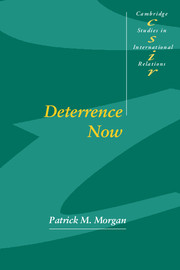Book contents
- Frontmatter
- Contents
- Acknowledgments
- List of abbreviations and acronyms
- Preface
- 1 History: deterrence in the Cold War
- 2 Deterrence and rationality
- 3 General deterrence
- 4 Testing, testing, one … two … three
- 5 Collective actor deterrence
- 6 The revolution in military affairs and deterrence
- 7 Deterrence in the post-Cold War world
- 8 Some conclusions
- References
- Index of names
- Index of subjects
- CAMBRIDGE STUDIES IN INTERNATIONAL RELATIONS
Preface
Published online by Cambridge University Press: 22 September 2009
- Frontmatter
- Contents
- Acknowledgments
- List of abbreviations and acronyms
- Preface
- 1 History: deterrence in the Cold War
- 2 Deterrence and rationality
- 3 General deterrence
- 4 Testing, testing, one … two … three
- 5 Collective actor deterrence
- 6 The revolution in military affairs and deterrence
- 7 Deterrence in the post-Cold War world
- 8 Some conclusions
- References
- Index of names
- Index of subjects
- CAMBRIDGE STUDIES IN INTERNATIONAL RELATIONS
Summary
I wanted to write this book because of several developments in the wake of the Cold War. First, the end of that era produced a profound adjustment in political relations among great states with nuclear arsenals, in spite of the continued existence of reciprocal threats of vast magnitude. They began to act, in many ways, as if those arsenals did not exist and in other ways as if those arsenals permitted relations on a friendlier basis than would otherwise have been possible. Thus most of them announced that they were significantly reducing their strategic nuclear arsenals and their nonstrategic nuclear forces and, on the other, that they had no intention – for the time being at least – of eliminating nuclear weapons because they remained important for security. I hope to show how this indicates that a number of things often taken for granted about nuclear weapons – and thus about nuclear deterrence and often about deterrence without nuclear weapons – are not necessarily true, and that certain other things that have been asserted about nuclear weapons and nuclear deterrence (and deterrence at other levels) are indeed correct. The end of the Cold War and the years since have been very illuminating and it is instructive to consider how.
Second, debate about deterrence, and related things such as threats, continues to churn in the academic and policy oriented literature, and it seems appropriate to reconsider the issues involved.
- Type
- Chapter
- Information
- Deterrence Now , pp. xv - xxPublisher: Cambridge University PressPrint publication year: 2003
- 1
- Cited by

